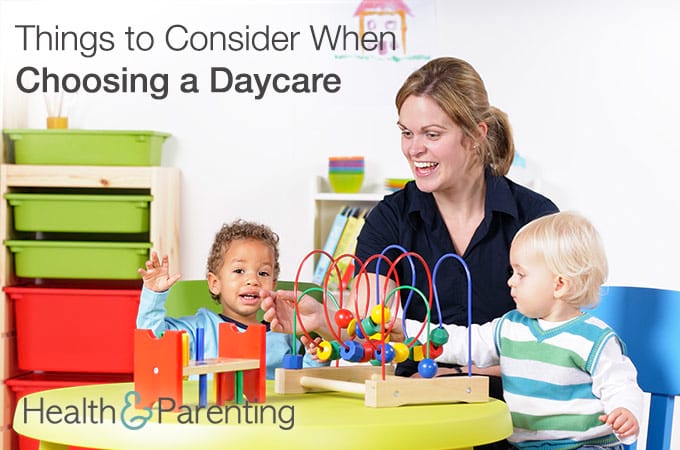Enrolling your child in daycare is a pretty huge parenting milestone. It is quite often one fraught with worry and anxiety, as you try to find the right daycare for your child. You may feel nervous about leaving your baby with strangers, and feel worried about how your baby (and you!) will cope with the separation.
Daycare can be an enriching, engaging and exciting environment for babies and toddlers. The range of activities on offer, regular routine and abundance of other children to play with mean many young children love daycare. Many babies and toddlers form strong bonds with their daycare key workers, allowing them to enjoy a strong attachment with an adult outside of the family.
Picking a daycare for your child may not be easy. Some parents just ‘know’ as soon as they walk into the right setting, but for others it can take months of deliberation to settle on the perfect daycare. However you decide to approach this decision, here are five important things you should consider:
- First impressions
First impressions are important. As a parent, you’ve probably gotten quite good at trusting your gut instinct. Sometimes it’s not quite possible to put your finger on why something doesn’t feel right, but that doesn’t mean you should ignore that bad feeling in the pit of your stomach. Think about your first impression. Does it seem like a happy place? Do you feel welcomed? Do you like the staff? It’s not just your first impressions that matter, think about how your baby reacts too. Does he seem happy and content in the new environment? Does he respond well to the staff members during your visit?
- Observations
Pay attention during your visit, you can learn a lot about a place by simply observing what’s going on around you. What are the children doing during your visit, do they look happy and engaged? How are the staff responding to upset or clingy children? Are they looking after the children in the way you would like them to take care of your own baby? Are the children being properly supervised? How are staff handling undesirable behaviour?
- The basics
It would be lovely to choose the daycare based solely on whether you love it, but in reality, there are other things to consider. Costs can add up, so you’ll need to do your sums and work out whether the daycare you like is within budget. Find out whether meals and diapers are provided, or whether you’ll need to buy these yourself, as this may affect the total cost. Do the daycare hours fit well with your work schedule? What happens if you’re late for pick up because of bad traffic or a late running train? Is the daycare easy to get to? These may not be the most glamorous of questions, but it’s important to consider them when making your decision.
- Recommendations
One of the best ways to find out what a childcare setting is really like, is to speak to other parents. A personal recommendation is worth a lot, so find out what other parents think about the daycare. If you don’t have any friends with children at the daycare. you could wait outside at drop off or pick up time and see if any of the parents can spare five minutes to tell you what they think. This way, you’ll get an unbiased opinion based on experience, which will give you something to go off when deciding where to send your child.
- The day to day
Facilities and activities can vary greatly between different childcare settings. Some may have amazing outdoor spaces, whereas others may invest more time and effort in trips outside the daycare gates. Newer settings may have better equipment, and some settings focus more on structured activities than others. Which of these matters most to you will depend upon what you think is most important (and more enjoyable) to your child. Find out how much time the children spend outside, and the sorts of activities the children engage with during a typical day. Are they free to play as they wish, or is there an element of structure within the day? How is undesirable behaviour dealt with, and does the answer compliment your parenting style?
Have you chosen a daycare setting for your child? And if so, what were the most important aspects to consider when making the decision?
Written by Fiona (@Fiona_Peacock), mother, writer and lover of all things baby related.
This information is not intended to replace the advice of a trained medical doctor. Health & Parenting Ltd disclaims any liability for the decisions you make based on this information, which is provided to you on a general information basis only and not as a substitute for personalized medical advice. All contents copyright © Health & Parenting Ltd 2016. All rights reserved.











